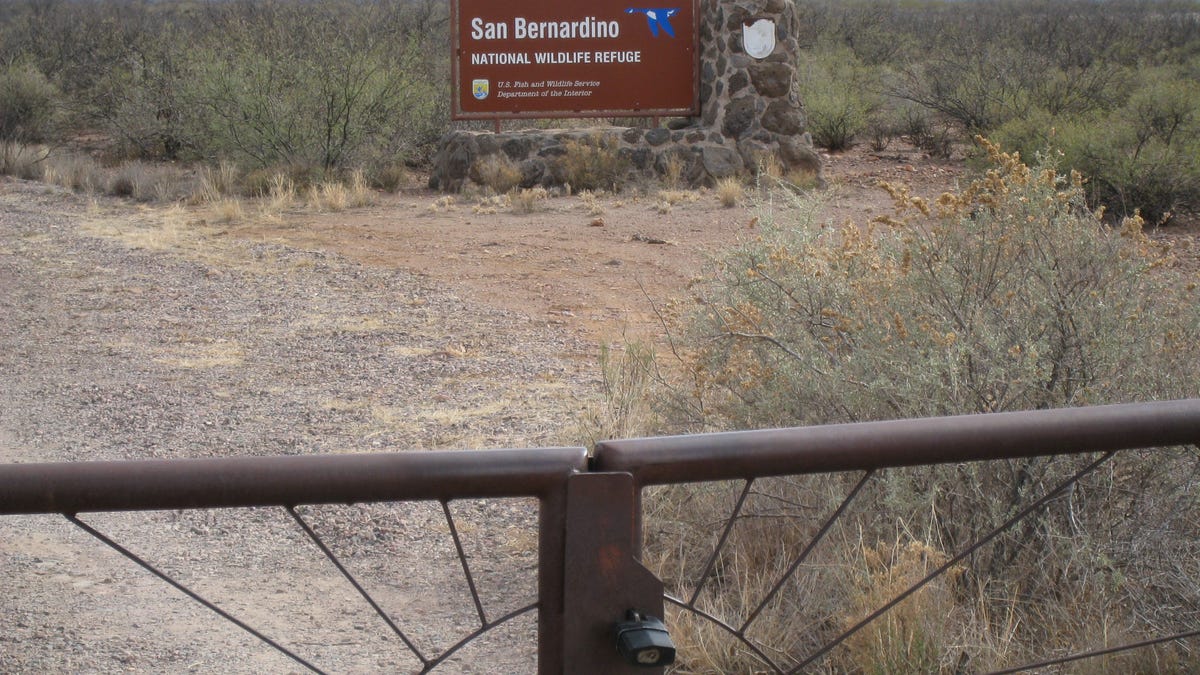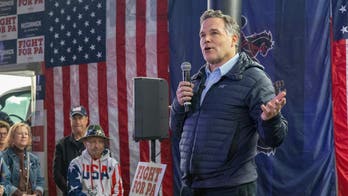
Jan. 8, 2010: A locked gate at the San Bernardino National Wildlife Refuge, where U.S. Customs and Border Protection agents usually wait for U.S. Forest Service officials to escort them onto federal lands even though they have keys for life-threatening situations, according to the House of Representatives' Natural Resources Committee Republicans. (House of Representatives Natural Resources Committee Republicans)
The unknown gunman who murdered an Arizona rancher three weeks ago entered and exited the U.S. illegally in an area where border agents are widely prohibited from using motorized vehicles, constructing roads and installing surveillance structures, federal agents have confirmed.
The development prompted four Republican congressmen to introduce legislation on Wednesday that will ban the Interior Department from using environmental regulations to hinder agents along the border, including at the San Bernardino National Wildlife Refuge, a 2,300-acre parcel near where rancher Robert Krentz was killed on March 27.
U.S. Reps. Doc Hastings of Washington, Peter King of New York, Rob Bishop of Utah and Lamar Smith of Texas say their bill, if passed, will address environmental degradation of federal lands and help close national security gaps along the border, which they say has become an uncontrolled highway.
"Effectively securing our borders against illegal entry is a matter of homeland security," King said in a statement prior to the scheduled 1 p.m. press conference at the U.S. Capitol Visitors Center in Washington. "Border Patrol agents spend every day on the front line, securing our homeland from terrorists. Denying or limiting the Border Patrol access to public lands and allowing the flow of illegals, including potential terrorists, doesn't protect anything."
The lawmakers say internal documents show that the Interior Department and the U.S. Forest Service have consistently and actively prevented Border Patrol agents from securing U.S. borders by requiring Department of Homeland Security officials to complete lengthy and expensive environmental analyses, and even blocking Border Patrol agents from entering some areas.
"As a result, Border Patrol agents are being forced to wade through bureaucratic red tape just so they can do the job Congress has mandated: gain operational control over the U.S. border," according to a fact sheet released by the House of Representatives' Natural Resources Committee Republicans.
Kendra Barkoff, a spokeswoman for the Interior Department told FoxNews.com that Secretary Ken Salazar visited the area last month to meet with land managers and federal, state, and local law enforcement, including U.S. Customs and Border Protection and Homeland Security officials.
She said Salazar places a high priority on working with DHS and other agencies to "meet the twin goals of protecting our national security and our natural resources."
But some federal lands are specifically targeted by criminals, drug traffickers and human smugglers for easy access into the United States from Mexico or Canada, the congressmen say.
The Interior Department, the primary land management agency for 40 percent of the Mexican border and 10 percent of the Canadian border, warned of potential problems in a fiscal year 2002-2003 Threat Assessment for Public Lands.
"Virtually all of the lands managed by Department Of The Interior (DOI) along the Arizona/Mexico border are sparsely populated with easy access into the United States from Mexico," the report reads. "Terrorist [sic] wishing to smuggle nuclear -- biological -- or chemical (NBC) weapons into the United States from Mexico could use well-established smuggling routes over DOI managed lands."
Border Patrol agents, park rangers and private citizens have been killed in these federal lands, most recently on March 27, when Krentz was murdered by a person who entered and exited the U.S. illegally via the San Bernardino Wildlife Refuge -- a fact confirmed to the House of Representatives' Natural Resources Committee Republicans by officials from both Customs and Border Protection and the Fish and Wildlife Service.
In 2007, Krentz's wife, Sue, wrote a letter to Congress opposing additional wilderness areas in Arizona she claimed would worsen criminal activity along the border.
"We have experienced $6.2 million dollars of damages to our ranch and water line because of illegal foot traffic," the letter read. "These areas along the border have long been targeted because of the high amount of private property with[in] the boundaries."
Krentz wrote that ranchers in the area, herself included, were fearful for their lives.
"It is not right that illegal immigrants and drug smugglers should take precedence over honest, hard-working Americans whose recreation and livelihood is damaged," the letter continued. "It is the job of the federal government to protect the defined United States borders from invasion."
In addition to blocking efforts to secure the border, the Republican lawmakers say Interior officials are charging Homeland Security millions of dollars for conducting Border Patrol operations on its land.
According to the fact sheet supplied by the House of Representatives' Natural Resources Committee Republicans, DHS has paid DOI more than $9 million since 2007 to mitigate the "environmental damage" of protecting the border. DHS officials agreed to pay an additional $50 million for mitigation funds to DOI, according to a memorandum of agreement in 2009, but DOI officials have yet to disclose how exactly those funds will be used.
"This extortion is taking valuable money away from Border Patrol that is needed to safeguard our nation," the fact sheet reads.
While not addressing the money exchanged between DOI to DHS, Barkoff said significant progress has been made through a joint effort.
"Collaborative work between DOI staff and DHS has allowed for border security infrastructure to be strategically located, including on federal lands, to meet DHS security requirement and goals, while substantially reducing government spending and significantly reducing adverse effects to natural and cultural resources."
DHS spokesman Matt Chandler added that "as challenges arise, we will continue to develop workable solutions on special status lands."
"When our border security activities require close collaboration with DOI and USFS, we view it as an opportunity to support each other's mission by preserving our natural resources while strengthening the security of our borders," he said in a statement.
Rancher Wendy Glenn, Krentz's longtime friend and neighbor who heard the man's last radio transmission to his brother, said she and other residents in the area have been calling for increased border security for years.
Glenn, who has roughly four miles of border fence along Malpai Ranch, said the ineffective and "wildlife-friendly" barrier ranges from large Normandy-style "X" crosses to standard posts and rails, topping off at no more than six feet high.
"It doesn't keep any people out," Glenn told FoxNews.com earlier this month. "We don't want any more fence here. We want more people on the border. No matter what they put in, they're going to tunnel under, cut through, or use ladders. We don't need that … We need more people on the border."
Glenn characterized the border fence as a "big waste of money" and called for increased federal presence along the remote areas, as well increased communication among law enforcement agencies.




